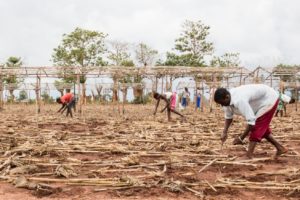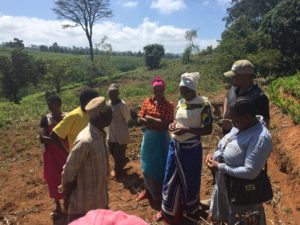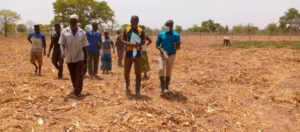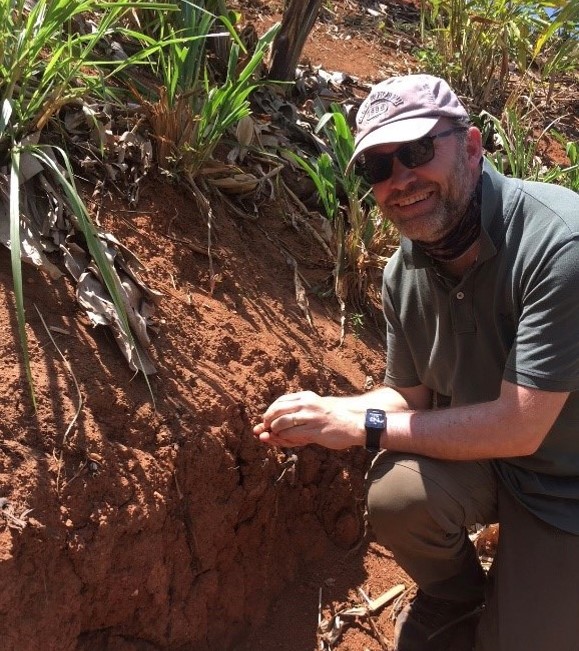The ability to grow crops to provide food for your family, or for sale, depends directly on soil health – the ability of soils to retain water and to supply the essential nutrients required for plant growth and human nutrition. However, with increasing pressures from a growing population, intensive agricultural practices and climate change, soil health is declining in many parts of Africa leading to concerns over the resilience of agricultural systems and sustainable food production.
Land management practices capable of improving soil health, notably by increasing the organic matter content that is vital for water retention and nutrient supply, are being widely implemented by African farmers and advocated further through interventions labelled as Climate-Smart Agriculture (CSA). CSA refers to agricultural land management strategies with the triple objectives of sustainably increasing agricultural productivity, enhancing resilience to climate change and reducing greenhouse gas emissions.
Climate Smart Agriculture in Africa
Climate-Smart Agriculture practices promoted across Africa include conservation agriculture (encompassing reduced tillage, cover cropping/mulching, and crop rotation/intercropping), soil and water conservation (including contour planting, terraces and bunds, planting pits, and irrigation), agroforestry, use of organic and inorganic fertilisers, and the use of improved seeds. There is a pressing need to build a stronger evidence base on which CSA practices work best under different socio-economic, biophysical and climatic conditions across Africa and to this end, we have recently published an overview paper on AFRICAP field studies in both Malawi and Tanzania, and those of related projects in Ghana.
Soil health studies formed an integral element of large multi-year, multi-disciplinary research programmes focused on identifying routes to build climate resilience in African Food Systems. As such, the findings offer insights on the significant value in ‘starting from the soil’ as a mechanism to ensure farmer engagement and empowerment through participatory research approaches. Studies also highlight the ability to build from local insights into guiding District-level and National policy discussions on climate resilience building in agricultural and food systems.
Conservation Agriculture Appraisals in Malawi
Our review of conservation agriculture initiatives globally has shown its ability to enhance maize yield resilience to heat stress. Previous Malawian analyses demonstrated the ability of conservation agriculture to also build resilience to dry spells and droughts, which threaten future food security. AFRICAP soil studies show that maize-based conservation agriculture systems improve soil structure, which is an important indicator of soil health that influences water and nutrient retention, aeration, microbial activities, and crop root growth. Studies on farmer decision-making have highlighted how adoption of CA practices remains low across much of Malawi due to labour constraints affecting crop residue management and the focus of Government programmes on inorganic fertilisers. We have also shown how integrated soil-based studies monitoring soil health can enable knowledge sharing and empowerment of farming communities.
 Planting maize in conservation agriculture field trial site at Chitedze, Malawi.
Planting maize in conservation agriculture field trial site at Chitedze, Malawi.
Soil & Water Conservation in Tanzanian Highlands
In the East Usumbara mountains of Tanzania, AFRICAP findings show that farmers’ awareness and use of soil health indicators are influencing their choice of land management practices and cropping choices. Farmers who were active in soil health monitoring, and received direct feedback on soil analyses in a timely manner, were able to link benefits in soil health to measures they were taking to diversify cropping strategies, reduce pests and disease, and alleviate the labour burden on highland farming communities.
 Farmer field-based discussions on soil health parameters in Tanga District, Tanzania.
Farmer field-based discussions on soil health parameters in Tanga District, Tanzania.
Integrated Soil Health Appraisals in Ghana
In Northern Ghana, our studies build on climate change and agricultural vulnerability appraisals involving both soils analyses and farmer discussions on climate information and impact-based forecasting of extreme events, including dry spells and droughts. Studies highlight the additional benefits enabled through combining improved seasonal, and sub-seasonal impact-based weather forecasting, with agricultural extension advice on specific CSA interventions aimed at enhancing soil organic matter content and therefore the water retention capacity of dryland soils.
 Soil sampling and community discussions in a conservation agriculture farm trial in northern Ghana.
Soil sampling and community discussions in a conservation agriculture farm trial in northern Ghana.
Starting from the Soil for co-design of CSA interventions
Taken together, these studies identify key insights provided through the inclusion of participatory soil health appraisals in trans-disciplinary research programmes and how these can be linked to locally appropriate agricultural extension advice capable of enhancing climate resilience in African farming systems. The focus on ‘starting from the soil’ enables buy-in from farming communities and the interactive discussions on soil health enables the building of stronger researcher–practitioner–policy collaborations required to underpin Climate-Smart Agriculture transformations that will be essential for resilience building across Africa.
About the Author

Andy Dougill is a Professor of Environmental Sustainability and the Dean for Global Development at the University of Leeds. He has researched a wide-range of African farming systems over the last 30 years and has developed innovative approaches for integrating research methodologies that use scientific approaches together with farmer participation to ensure locally relevant outputs. He is the Country Co-ordinator for Malawi in the AFRICAP programme.
More details on the work presented here can be found in: Dougill, A.J., Hermans, T.D.G., Eze, S., Antwi-Agyei, P., Sallu, S.M. (2021). Evaluating Climate-Smart Agriculture as Route to Building Climate Resilience in African Food Systems. Sustainability, 13(17), 9909 – https://www.mdpi.com/2071-1050/13/17/9909/htm
